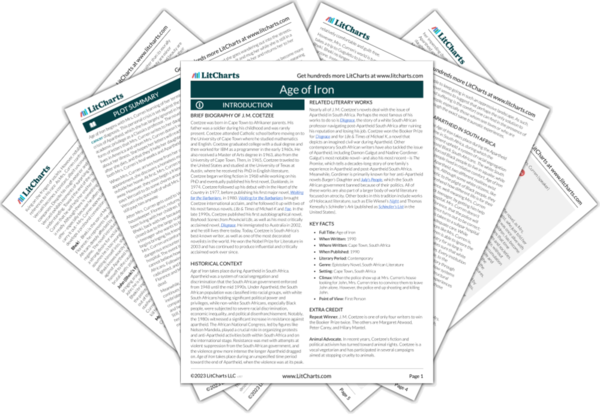Age of Iron is made up of a series of letters that Mrs. Curren writes to her daughter in America. As such, the entire novel is filtered through Mrs. Curren’s perspective. Although her letters are open and honest, it’s also important to keep in mind that she’s an unreliable narrator; that is, as her letters come from her perspective, they are naturally biased and reflect how she thinks about things more than they reflect the truth. Although there are reasons to be skeptical of Mrs. Curren’s descriptions—after all, the story is, in part, about the limitations of white people to comprehend Apartheid in South Africa—the novel suggests that there’s still value and power in Mrs. Curren’s writing, and indeed, in literature more broadly. For one, writing helps Mrs. Curren process her situation, both her impending death and her burgeoning understanding of Apartheid and its horrors. It then helps her connect with her daughter, who will, Mrs. Curren hopes, read the letters after Mrs. Curren dies and better understand her mother’s final weeks.
A former Classics professor, Mrs. Curren uses numerous references to classic writers and works to make sense of events happening around her. For instance, she considers the Athenian historian Thucydides and his writing on war after witnessing the “warzone” of Guguletu. This reference in particular illustrates how Mrs. Curren can better understand this conflict happening in her present thanks to writing on similar subjects from centuries ago. With this, Age of Iron suggests that writing and literature—from classic works from more than a thousand years ago to the novel itself—have the unique ability to teach empathy and understanding to both readers and writers.
The Value of Writing and Literature ThemeTracker

The Value of Writing and Literature Quotes in Age of Iron
The first task laid on me, from today: to resist the craving to share my death. Loving you, loving life, to forgive the living and take my leave without bitterness. To embrace death as my own, mine alone.
To whom this writing then? The answer: to you but not to you; to me; to you in me.
How easy it is to love a child, how hard to love what a child turns into! Once upon a time, with his fists to his ears and his eyes pinched shut in ecstasy, this creature too floated in a woman’s womb, drank of her blood, belly to belly. He too passed through the gates of bone into the radiance outside, was allowed to know mother-love, amor matris. Then in the course of time was weaned away from it, made to stand alone, and began to grow dry, stunted, crooked. A life apart, deprived, like all lives; but in this case, surely, more undernourished than most. A man in his middle years still sucking on bottles, yearning for the original bliss, reaching for it in his stupors.
He is a teacher, I thought: that is why he speaks so well. What he is doing to me he has practiced in the classroom. It is the trick one uses to make one’s own answer seem to come from the child. Ventriloquism, the legacy of Socrates, as oppressive in Africa as it was in Athens.
I tell you the story of this morning mindful that the storyteller, from her office, claims the place of right. It is through my eyes that you see; the voice that speaks in your head is mine. Through me alone do you find yourself here on these desolate flats, smell the smoke in the air, see the bodies of the dead, hear the weeping, shiver in the rain. It is my thoughts that you think, my despair that you feel, and also the first stirrings of welcome for whatever will put an end to thought: sleep, death. To me your sympathies flow; your heart beats with mine.
And after that, after the dying? Never fear, I will not haunt you. There will be no need to close the windows and seal the chimney to keep the white moth from flapping in during the night and settling on your brow or on the brow of one of the children. The moth is simply what will brush your cheek ever so lightly as you put down the last page of this letter, before it flutters off on its next journey. It is not my soul that will remain with you but the spirit of my soul, the breath, the stirring of the air about these words, the faintest of turbulence traced in the air by the ghostly passage of my pen over the paper your fingers now hold.
“Is it time?” I said.
I got back into bed, into the tunnel between the cold sheets. The curtains parted; he came in beside me. For the first time I smelled nothing. He took me in his arms and held me with mighty force, so that the breath went out of me in a rush. From that embrace there was no warmth to be had.











